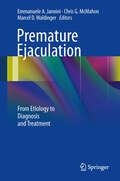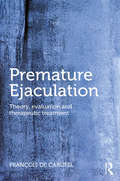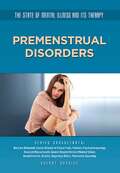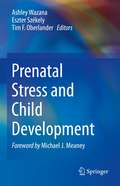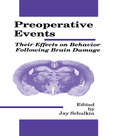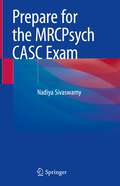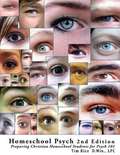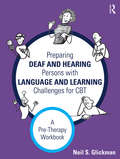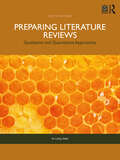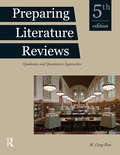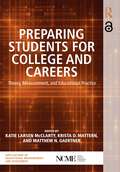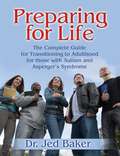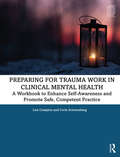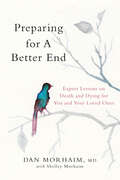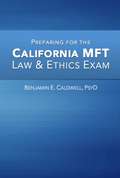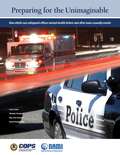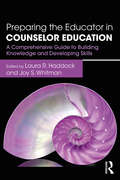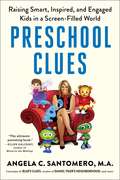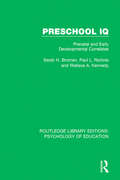- Table View
- List View
Premature Ejaculation
by Emmanuele A. Jannini Chris G. Mcmahon Marcel D. WaldingerPremature ejaculation (PE) is a common male sexual complaint, with a self-reported prevalence of 20-30% in observational studies. Over the past 10-20 years, our understanding of PE has evolved from the initial premise that it is a psychological disorder to the current recognition of an underlying biological and probably genetic predisposition in many cases. This new understanding has been accompanied by novel approaches to the assessment and treatment of patients with PE. Premature Ejaculation is the first truly contemporary reference volume on the subject. It covers a broad range of aspects relevant to PE, including past and current definitions of the condition, the etiology of PE, its epidemiology, the impact of PE on both the patient and his partner, and the treatment of PE using pharmacotherapy and/or psychotherapy/cognitive behavioral therapy. The book is well illustrated and referenced, and the primary focus throughout is on evidence-based medicine. This timely and authoritative volume will be of great value to sexual health physicians, andrologists, endocrinologists, urologists, psychiatrists, sexologists, psychologists, and other interested healthcare professionals.
Premature Ejaculation: Theory, Evaluation and Therapeutic Treatment
by Francois de CarufelPremature Ejaculation presents a unique and innovative therapeutic program for the successful treatment of premature ejaculation. This descriptive and well-structured program is fundamentally different from traditional sex therapy and contemporary sexual medicine. Centred on the management of sexual excitement, it enables couples to prolong the length of intercourse without having to interrupt their lovemaking or resort to medication. The program’s sexological approach also empowers couples with the skills and knowledge to strengthen their sex life leading to a healthier and happier relationship. Combining theory and practical instruction, François de Carufel’s book promotes a better understanding of premature ejaculation. It offers a new perspective on the causes of this dysfunction and provides practitioners and therapists with concrete ways to assist men and women in improving their sex life. Premature Ejaculation will be of interest and value to health professionals and graduate students in all fields dealing with sexual difficulties, including psychology, social work, medicine, physical therapy, nursing and counselling.
Premenstrual Disorders (The State of Mental Illness and Its Ther #19)
by Sherry BonnicePremenstrual syndrome plays a very real role in the lives of adolescent girls and women who suffer from its symptoms. Although this disorder has been misunderstood, undertreated, and disregarded as merely "all in her head," research confirms that PMS is a problem that can cause women to suffer poor relationships, lower academic grades, and physical and mental disturbances. Furthermore, doctors now understand that premenstrual disorders are legitimate medical conditions with real and serious implications for women's mental well-being. In this book you can learn about premenstrual disorders, how they have been unfairly stigmatized, and how they are finally being understood. With new medical understanding has come new treatments. Learn about antidepressants and other medications currently being used to treat serious symptoms of premenstrual disorders. In addition, you can learn about the benefits, risks, and side effects associated with these drugs as well as alternative treatments for premenstrual disorders. While you read, you will share in the experiences of many women from high school to perimenopausal age who have struggled with premenstrual disorders and their effects. In their stories, you will see that due to new understanding and treatments, women experiencing premenstrual disorders no longer need to feel stigmatized or alone.
Prenatal Bonding Analysis: The Invisible Umbilical Cord
by György Hidas Jenő Raffai Judit VollnerThis book presents a novel psychoanalytic and psychotherapeutic method which enables expectant mothers to establish communication with their unborn babies. After an exploration of the root aspects of pre- and perinatal psychology and psychoanalysis, details of the practice of prenatal bonding analysis are introduced. The volume concludes with 15 interviews where mothers who experienced the bonding analysis give first-hand accounts of their encounters. With its theoretical, practical and testimonial threefold structure, the book aims at reaching out to both specialists and a general readership, especially prospective parents.
Prenatal Development and Parents' Lived Experiences: How Early Events Shape Our Psychophysiology and Relationships (Norton Series on Interpersonal Neurobiology)
by Michael Shea Ann Diamond WeinsteinThe influence of the preconception and prenatal period on child development and parent-child relationships. This book presents recent knowledge, research, and theory about the earliest developmental period--from conception to birth--which holds even greater consequences for the health and development of the human organism than was previously understood. Theory and research in multiple disciplines provide the foundation for the exploration of how experiences during conception and time in the womb; during and after birth; and experiences with caregivers and the family system in the early postnatal period impact an individual physically, cognitively, emotionally, and socially over their life span. Knowledge drawn from numerous fields highlights the opportunity for parents-to-be and the practitioners who care for them to intentionally support the cultivation of nurturing internal and external environments during the preconception, prenatal, and early parenting periods. Theory and research from the fields of psychology, medicine, psychophysiology, epigenetics, and traumatology, among others, suggest that doing so will support lifelong multidimensional aspects of healthy development in children and adults and may also benefit future generations.
Prenatal Family Dynamics: Couple and Coparenting Relationships During and Postpregnancy
by James P. McHale Regina Kuersten-HoganThis book examines family interactions and relationships during the transition to parenthood. It offers a unique integration of different lines of research on prenatal family dynamics contributed by leading family researchers in North America and Europe who use observational approaches to study emergent family processes. The book explores prenatal dynamics in diverse families, including adolescent couples, same-sex couples, couples experiencing infertility, and couples expecting their second child. The introduction, anchored in family systems and structural theories, provides an overview of challenges couples commonly experience during the transition to parenthood and details prenatal family processes that predict postpartum adjustment in families. This sets the stage for subsequent chapters by emphasizing unparalleled windows into prenatal family dynamics provided by direct observation. Initial chapters focus on predictors of prenatal interactions and partners’ representations of parenthood. Subsequent chapters describe original research on prebirth couple interactions and the coparenting relationship emerging during pregnancy. The volume includes several studies that rely on innovative research designs using observations of simulated couple encounters with their newborn, represented by a life-sized infant doll. The book concludes with a review of recent prenatal intervention programs designed to improve interpersonal and coparenting relationships of married and unmarried couples. The volume offers recommendations for future research on prenatal family dynamics, including suggestions for methodological advances, exploration of prenatal risk factors, expansion of conceptual models to incorporate culturally-meaningful coparents besides mothers and fathers, and further focus on prenatal intervention programs. This book is an essential resource for researchers, clinicians and professionals, and graduate students in the fields of infant mental health/early child development, family studies, pediatrics, developmental psychology, public health, social work, and early childhood education.
Prenatal Stress and Child Development
by Ashley Wazana Eszter Székely Tim F. OberlanderThis book examines the complex impact of prenatal stress and the mechanism of its transmission on children’s development and well-being, including prenatal programming, epigenetics, infl ammatory processes, and the brain-gut microbiome. It analyzes current findings on prenatal stressors affecting pregnancy, including preconception stress, prenatal maternal depression, anxiety, and pregnancy-specific anxieties. Chapters explore how prenatal stress affects cognitive, affective, behavioral, and neurobiological development in children while pinpointing core processes of adaptation, resilience, and interventions that may reduce negative behaviors and promote optimal outcomes in children. Th is complex perspective on mechanisms by which early environmental influences interact with prenatal programming of susceptibility aims to inform clinical strategies and future research targeting prenatal stress and its cyclical impact on subsequent generations.Key areas of coverage include:The developmental effects of prenatal maternal stress on children.Epigenetic effects of prenatal stress.Intergenerational transmission of parental early life stress.The microbiome-gut-brain axis and the effects of prenatal stress on early neurodevelopment.The effect of prenatal stress on parenting.Gestational stress and resilience.Prenatal stress and children’s sleeping behavior.Prenatal, perinatal, and population-based interventions to prevent psychopathology.Prenatal Stress and Child Development is an essential resource for researchers, professors and graduate students as well as clinicians, therapists, and related professionals in infancy and early childhood development, maternal and child health, developmental psychology, pediatrics, social work, child and adolescent psychiatry, developmental neuroscience, and related behavioral and social sciences and medical disciplines.Excerpt from the foreword:“I would make the plea that in addition to anyone with an interest in child development, this book should be essential reading for researchers pursuing “pre-clinical, basic science models of neurodevelopment and brain health”…. This book provides what in my mind is the most advanced compilation of existing knowledge and state-of-the-art science in the field of prenatal psychiatry/psychology (and perhaps in the entire field of prenatal medicine). This volume can brilliantly serve to focus future directions in our understanding of the perinatal determinants of brain health.”Michael J MeaneyJames McGill Professor of MedicineTranslational Neuroscience Programme Adjunct Professor of Paediatrics
Preoperative Events: Their Effects on Behavior Following Brain Damage (Comparative Cognition and Neuroscience Series)
by Jay SchulkinPreoperative Events switches the focus from post-operative rehabilitation to preoperative experiences and personal histories to lessen the consequences of brain damage. These papers document the relationship between preoperative experience and postoperative performance and discuss a variety of protective preoperative experiences that can ameliorate the deleterious effects of brain damage.
Preparatory States and Processes
by Sylvan Kornblum and Jean RequinPreparation is a term that is used quite freely during private, informal discussions. As the argument becomes more formal and more public, “priming,” “ feed-forward” and similar jargon terms take its place, presumably because they are better defined, safer, and more acceptable. However, in spite of the caution that surrounds its use, it is clear that “preparation” denotes a useful concept. The purpose of the Franco-American Conference on Preparatory States and Processes was to try to clarify this concept by inviting investigators from different specialties in the behavioral and neural sciences to present and discuss illustrations of the use of the concept from their own work. First published in 1984. Routledge is an imprint of Taylor & Francis, an informa company.
Prepare for the MRCPsych CASC Exam
by Nadiya SivaswamyThis book serves as a comprehensive resource for all candidates preparing for the Clinical Assessment of Skills and Competencies (CASC) examination, component of the MRCPsych exams for Psychiatrists. It includes over a 100 scenarios encompassing the breadth of commonly encountered clinical assessments that could feature as CASC exam stations. Key points, buzz words and phrases that are relevant to the station are clearly highlighted. The focus in each station is on communication and maintaining a structured approach which is essential to ensure every aspect relevant to a station is covered in the 7 minutes and adheres to the CASC exam blueprint of the RCPsych. This volume is an essential tool for all core trainees in Psychiatry, general practice trainees, specialty/staff grade doctors in Psychiatry and international medical graduates preparing for the CASC exam.
Preparing Christian Homeschool Students For Psychology 101
by Timothy S. RiceHomeschoolPsych 2nd Edition: Preparing Christian Homeschool Students for Psych 101 and the accompanying Student Workbook are all a busy homeschooling mom (or dad) need. Prepare student to recognize the worldview assumption underlying modern Psychology s theories and schools-of-thought and introduce them to the study of God s greatest creation the human mind from a distinctly Christian perspective. Since the first edition was published in 2008, thousands of homeschoool students have used Homeschool Psych to study psychology from a Christian perspective.
Preparing Deaf and Hearing Persons with Language and Learning Challenges for CBT: A Pre-Therapy Workbook
by Neil S. GlickmanPreparing Deaf and Hearing Persons with Language and Learning Challenges for CBT: A Pre-Therapy Workbook presents 12 lessons to guide staff in hospital and community mental health and rehabilitation programs on creating skill-oriented therapy settings when working with people who don’t read well or have trouble with abstract ideas, problem solving, reasoning, attention, and learning. Drawing from the worlds of CBT, current understandings of best practices in psychotherapy, and the emerging clinical specialty of Deaf mental health care, the workbook describes methods for engaging people who are often considered poor candidates for psychotherapy.
Preparing For Today’s Global Job Market
by Christopher Anne Robinson-easleyFrom the Lens of Color identifies and delineates a methodology for effectively positioning and/or repositioning oneself in today's global job market that moves significantly beyond strategies associated with simply developing a resume, cover letter or business plan.
Preparing Literature Reviews: Qualitative and Quantitative Approaches
by M. Ling Pan Jacqueline S. CravenPreparing Literature Reviews is an accessible guide that provides easy to follow step-by-step advice on how to prepare qualitative and quantitative literature reviews. The 6th edition of this bestselling book retains its original lauded features of clear style and organization while bringing new chapters into the fold to address mixed-methods and theoretical frameworks in conducting reviews of literature.The text walks the reader through both the conceptualization and the writing stages, offering templates for fostering different phases of designing and drafting required to complete the process of conducting a review of literature from start to finish, in empirical articles, theses, or dissertations. New examples of literature reviews utilizing various approaches have been added, and there is also additional coverage of concepts such as literature organization, plagiarism, reviewing, topic selection, and writing. Commentary on literature in a variety of fields assists readers with understanding the structure and components of literature reviews.Perfect as an introductory or supplementary text, Preparing Literature Reviews offers a comprehensive consideration of each aspect of conducting literature reviews, making it an essential resource for students across the social and behavioural sciences, education, and the humanities.The accompanying Instructor and Student Resources website provides free digital materials designed to enhance student learning and save instructors time when preparing lessons. Resources include: Flashcards for students to independently test their knowledge. Student focused materials including advice on writing style, plagiarism, literature mapping, and a theory evaluation checklist. Video explanations on Prisma 2020 and APA Journal Article Reporting Standards. Instructor checklist and PowerPoint slides that correspond to the chapters to save valuable time preparing lessons.
Preparing Literature Reviews: Qualitative and Quantitative Approaches
by M Ling Pan• Illustrates all the steps in preparing qualitative and quantitative literature reviews. • Emphasizes topic selection, locating literature, and avoiding major pitfalls in evaluating and synthesizing literature. • Shows how to improve literature reviews through the judicious inclusion of statistical results found in the literature. • Provides easy-to-follow advice on how to avoid misrepresenting the results of published research in literature reviews. • The numerous examples throughout the text and the nine model literature reviews clarify the process of following the guidelines for writing solid, state-of-the-art literature reviews. • Shows students how to blend qualitative and quantitative approaches to preparing literature reviews without being overly mathematical. • Two chapters present clear explanations of how to conduct meta-analyses. • All examples have been updated to ensure consistency with the sixth edition of the Publication Manual of the American Psychological Association and the fourth edition of the American Sociological Association’s Style Guide.
Preparing Students for College and Careers: Theory, Measurement, and Educational Practice
by Katie Larsen McClarty Krista D. Mattern Matthew N. GaertnerPreparing Students for College and Careers addresses measurement and research issues related to college and career readiness. Educational reform efforts across the United States have increasingly taken aim at measuring and improving postsecondary readiness. These initiatives include developing new content standards, redesigning assessments and performance levels, legislating new developmental education policy for colleges and universities, and highlighting gaps between graduates’ skills and employers’ needs. In this comprehensive book, scholarship from leading experts on each of these topics is collected for assessment professionals and for education researchers interested in this new area of focus. Cross-disciplinary chapters cover the current state of research, best practices, leading interventions, and a variety of measurement concepts, including construct definitions, assessments, performance levels, score interpretations, and test uses.
Preparing for Life: The Complete Guide for Transitioning to Adulthood for those with Autism and Asperger's Syndrome
by Jed BakerA life skills guide for individuals with autism and Asperger's syndrome discusses social skills and strategies needed for success in the adult world, including discussion of perspective-taking, nonverbal communication skills, and stress management.
Preparing for Trauma Work in Clinical Mental Health: A Workbook to Enhance Self-Awareness and Promote Safe, Competent Practice
by Lisa Compton Corie SchoenebergThis workbook is a foundational and unique resource for clinicians preparing to work with clients affected by trauma. Chapters integrate a holistic understanding of the unique client within trauma-specific case conceptualization, promote trainees’ identification of personal values and past experiences that could impact their ability to provide safe and ethical services, and offer ways to reduce the risk of occupational hazards such as vicarious traumatization. The trauma treatment process is presented within the tri-phasic framework, which is applicable across settings, disciplines, and various theoretical orientations. Each chapter also provides experiential activities that link the chapter content with clinician reflection and application of knowledge and skills, which instructors and supervisors can easily utilize for evaluation and gatekeeping regarding a student’s mastery of the content. An ideal resource for graduate-level faculty and supervisors, this book offers a versatile application for mental-health related fields including counseling, psychology, social work, school counseling, substance abuse, and marriage and family therapy. Designed for students and professional clinicians, this groundbreaking text fills an important education and training gap by providing a comprehensive and enlightening presentation of trauma work while also emphasizing the clinician’s growth in self-awareness and professional development.
Preparing for a Better End: Expert Lessons on Death and Dying for You and Your Loved Ones
by Dan MorhaimA vital roadmap to planning your own end-of-life care.While modern Americans strive to control nearly every aspect of their lives, many of us abandon control of life's final passage. But the realities of twenty-first-century medicine will allow most of us to have a say in how, when, and where we die, so we need to make decisions surrounding death, too. Or those decisions may be made for us. Threading compelling real-life stories and practical guidance throughout, this book helps readers navigate end-of-life care for themselves and their loved ones.In this practical guidebook, Dr. Dan Morhaim and Shelley Morhaim offer readers hope, empowerment, and inspiration. What we choose for our end-of-life care, they assert, depends on accurate information and on our personal values. We need these not only to understand new medical advances but also to appreciate the wisdom of humanity's past and present. Dan Morhaim, an emergency medicine physician and former Maryland state legislator, guides readers through the medical, legal, and financial maze of end-of-life care. He details the care choices available to patients and explains why living wills and advance directives are a necessity for every American. He tells readers where to find free and readily available living wills and advance directives and why it is so important for everyone—young and old—to complete them. Meanwhile, Shelley Morhaim draws on her experience as a therapeutic music practitioner for hospice and hospital patients to offer compassion to readers facing hard decisions.The authors reflect on a number of timely topics, including• what doctors—including Dr. Morhaim specifically—want for themselves in terms of end-of-life care• how legislative initiatives on assisted dying vary by state• how to obtain medical orders for life-sustaining treatment (MOLST/POLST)• how to deal with dementia• what to expect from palliative and hospice care• how to cope with pain at the end of life, including with medical cannabis and narcotics• how organ donation and body disposition work• how to communicate individual needs to lawyers, physicians, and family members• how to make decisions when selecting the best care for yourself and othersand more.Organized as a roadmap that people should follow when they plan end-of-life care and contingencies, this book helps readers keep decisions in their own hands and spare their families the uncertainty and trauma of guessing about their end-of-life wishes. Breaking down the barriers to a difficult but essential topic, Preparing for a Better End helps readers open this often-avoided discussion with their loved ones while providing the information and guidance needed to ensure that deeply held values are reflected and honored.Praise for the Author "In The Better End, Dr. Morhaim helps the reader to see that while death does have its sting, it need not be bitter, and each of us can prepare for the end in better ways."—Maya Angelou "Dan Morhaim's message is a must read for anyone who is facing end-of-life crisis issues and concerns, whether it be for themselves or for a family member or loved one. When so many others shun away from the topic, Dan Morhaim addresses the situation with clarity, insight, and sensitivity."—Montel Williams
Preparing for the California MFT Law & Ethics Exam
by Benjamin E. CaldwellThis text is designed to prepare you for the California MFT Law & Ethics Exam. It is quick and efficient, focused squarely on the information you need to know for the test. It addresses each and every one of the 121 "knowledge statements" the BBS uses when developing the exam itself.
Preparing for the Unimaginable: How Chiefs Can Safeguard Officer Mental Health Before and After Mass Casualty Events
by Laura Usher Stefanie Friedhoff Major Sam Cochran Anand PanayaWhile most government agencies are trained in how to react to a mass casualty event such as a terrorist attack or natural disaster, few are prepared to deal with the psychological fallout for first responders. Preparing for the Unimaginable fills that void. This book is the product of the National Alliance on Mental Illness’s work with the Newtown, Connecticut, police force in efforts to cope with the shooting at Sandy Hook Elementary school that left twenty six people, including twenty children, dead. This unique publication offers expert advice and practical tips for helping officers to heal emotionally, managing the public, dealing with the media, building relationships with other first responder agencies, and much more. Complete with firsthand accounts of chiefs and officers that have guided their departments through mass casualty events, Preparing for the Unimaginable seeks to provide practical, actionable strategies to protect officer mental health before and after traumatic events.
Preparing the Educator in Counselor Education: A Comprehensive Guide to Building Knowledge and Developing Skills
by Joy S. Whitman Laura R. HaddockPreparing the Educator in Counselor Education is a comprehensive skill development resource for counselor educators looking to engage students, develop curriculum, and provide effective feedback. Chapters fully aligned with the 2016 CACREP standards and grounded in current research discuss topics including pedagogy, identity development, classroom diversity, student engagement, teaching strategies, ethical and legal issues, gatekeeping, and mentoring. The book is replete with guided practice exercises, descriptive commentary, illustrative case studies, and examples from seasoned professionals that provide context, humor, and encouragement.
Preparing to Die: Practical Advice and Spiritual Wisdom from the Tibetan Buddhist Tradition
by Andrew HolecekWe all face death, but how many of us are actually ready for it? Whether our own death or that of a loved one comes first, how prepared are we, spiritually or practically? In Preparing to Die, Andrew Holecek presents a wide array of resources to help the reader address this unfinished business. Part One shows how to prepare one's mind and how to help others, before, during, and after death. The author explains how spiritual preparation for death can completely transform our relationship to the end of life, dissolving our fear and helping us to feel open and receptive to letting go in the dying process. Daily meditation practices, the stages of dying and how to work with them, and after-death experiences are all detailed in ways that will be particularly helpful for those with an interest in Tibetan Buddhism and in Tibetan approaches to conscious dying. Part Two addresses the practical issues that surround death. Experts in grief, hospice, the funeral business, and the medical and legal issues of death contribute chapters to prepare the reader for every practical concern, including advance directives, green funerals, the signs of death, warnings about the funeral industry, the stages of grief, and practical care for the dying. Part Three contains heart-advice from twenty of the best-known Tibetan Buddhist masters now teaching in the West. These brief interviews provide words of solace and wisdom to guide the dying and their caregivers during this challenging time. Preparing to Die is for anyone interested in learning how to prepare for death from a Buddhist perspective, both spiritually and practically. It is also for those who want to learn how to help someone else who is dying, both during the time of illness and death as well as after death.
Preschool Clues: Raising Smart, Inspired, and Engaged Kids in a Screen-Filled World (Blues Clue's Ready To Read Ser. #No. 1)
by Deborah Reber Angela C. SantomeroThe award-winning creator of Blue&’s Clues, Super Why!, and Daniel Tiger&’s Neighborhood shares the secret sauce behind her shows&’ powerful, transformative results in the form of eleven research-based, foundational &“clues&” to ensure that preschoolers flourish academically, socially, and emotionally during this critical time.The preschool years—when children are between the ages of two and five—are the most influential, important years in a child&’s life. Studies show that pausing to interact, playing to solve problems, diffusing with humor, and using repetition are the hidden clues conscious parents use to raise successful kids and help them learn critical thinking skills, foster empathy, and nurture their sense of self-worth. Angela C. Santomero, MA, the award-winning creator of children&’s television phenomena knows this better than anyone and has spent decades working to instill confidence in her young viewers. In Preschool Clues, she breaks down the philosophy behind her shows—educating, inspiring, and empowering kids—into concrete strategies that parents and educators can incorporate into their family and classroom to set their preschoolers up for success, such as: -Intentionally pausing to foster bonding, independence, and resilience -Developing empathy and confidence through soliciting preschoolers&’ help -Becoming &“fluent&” in the language of preschoolers: Play -Igniting your preschooler&’s curiosity -Being an involved co-player everyday -Designing a healthy media diet In Preschool Clues, Angela shares the latest research from top thinkers in child development and education. Through her practical, straightforward advice and inspiring, conversational approach, you will not only understand exactly what your children are learning from the shows they watch and why these shows are so effective, you&’ll know exactly how to apply these same proven approaches in your daily life and with the same powerful results.
Preschool IQ: Prenatal and Early Developmental Correlates (Routledge Library Editions: Psychology of Education)
by Sarah H. Broman Paul L. Nichols Wallace A. KennedyOriginally published in 1975, this volume reports a multidisciplinary, longitudinal study of the precursors of intelligence, as measured by Stanford-Binet IQ scores, of 4-year-old children. Over 26, 000 children (more than 12, 000 whites and 14,000 blacks) were followed from the prenatal period, and 169 prenatal and developmental variables were examined in relation to preschool IQ scores. Considered are the degree to which events during pregnancy and delivery, physical and psychomotor development in infancy and childhood, and certain major family characteristics were related to IQ scores. The large, heterogeneous sample of children studied prospectively and the wide range of biological and social variables investigated made this work of major importance at the time. The level of maternal education and the socioeconomic status of the family were major contributors to explained variance in IQ, and had larger effects among whites than among blacks. Other findings relate low IQ at age 4 to delayed motor and mental development in infancy. Many other factors thought to affect IQ scores, both individually and in combination, are reported, to make this a work of importance to all concerned with the neurological and mental development of the child.
